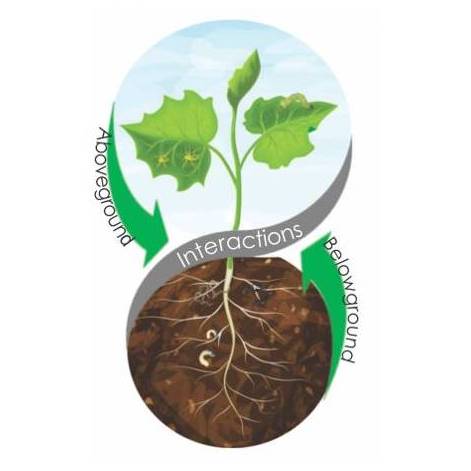Opportunity to Learn and Research Nematode-Plant-Insect Interactions
Research Description
 The Mundim Lab is recruiting motivated students interested in learning and researching about plant-mediated interactions with aboveground insects and belowground nematodes. Most of our work is experimental (field, greenhouse or lab), although field collections are expected. The main idea of the lab is to understand how host-plants can manage so many interactions occurring simultaneously or in sequence. We seek an in-depth understanding of the link between above (aerial) and belowground (soil) interactions and how the organisms affect each other.
The Mundim Lab is recruiting motivated students interested in learning and researching about plant-mediated interactions with aboveground insects and belowground nematodes. Most of our work is experimental (field, greenhouse or lab), although field collections are expected. The main idea of the lab is to understand how host-plants can manage so many interactions occurring simultaneously or in sequence. We seek an in-depth understanding of the link between above (aerial) and belowground (soil) interactions and how the organisms affect each other.
We have a few ongoing and starting projects (see below for details). The students’ weekly responsibilities are in general: (1) Read scientific papers; (2) weekly meetings with the research team to discuss the ongoing experiments and build professional skills; (3) care for plants, insects and nematodes colonies; (4) assist with field and greenhouse experiments and data collection; (5) if desired, develop an independent project. Depending on the project of choice, the details of caring for the organisms and the experiments will be adjusted.
Project 1: How plants handle multiple herbivores?
Description: Host-plants encounter multiple herbivores several times throughout its life or even within a growing season. Plants, as organisms that cannot simply move to a less stressed environment, developed the ability to use previous information of herbivory-stress to adapt and be prepared for future ones. The key to make it in any environment successfully is to respond to multiple stress situations without sacrificing fitness. We are interested in understanding how the plant accomplishes this.
This research project specifically explores how plants mediate multiple herbivores (in leaves and roots) and how they impact future interactions that the plant will host (especially herbivory).
System and Implications: The system for this project comprises plant species in the genus Solanum (e.g., tomato, eggplant, and bittersweet nightshade) and their natural and agricultural pests (e.g., nematodes, caterpillars, aphids, and some beetles). Understanding plant strategies in predicting and responding to stimuli and stressors can help us elucidate fitness benefits for plants in natural settings as well as those important in agricultural systems.
Project 2. Belowground communities shape complex array of aboveground interactions
Description: Relationships between multiple individuals or species in the same environment encompass direct and indirect effects among those involved. A direct effect represents a positive or negative impact of one individual on another (e.g., interspecific interactions such as mutualism, competition, and predation). An indirect effect originates when a third party mediates the impact (e.g., apparent competition, trophic cascade, habitat facilitation). Although direct and indirect effect pathways are well known in aboveground and belowground compartments, only recently we have started to address how soil organisms affect those in the opposite compartment (i.e., aboveground) and vice-versa.
This research project will explore trophic cascades, habitat facilitation, and indirect competition between aerial and soil compartment organisms that share, visit, or are infected by the same third party.
System and Implications: We are interested in various agricultural pests (nematodes, caterpillars, aphids, and leaf beetles) and how they affect and are controlled by each other. This study will improve our understanding about the role of soil organisms in biodiversity maintenance and agricultural sustainability.
Qualifications and Requirements
The Mundim lab is a respectful and friendly environment that appreciates and welcomes the differences among us, whether in race, gender identification, sexual orientation, ethnicity, beliefs, or disabilities. In the Mundim lab we believe that a diverse group is essential to help us query the world from multiple perspectives and in inventive ways!
In this first semester, 2-3 students will be accepted per project. Depending on the student’s interests, they can be hired for successive semesters (in the same project or a different one).
We are open to Biology students, but we will also consider interested students from other departments. We do not require previous experience or deep knowledge in the subject; we as a lab work and learn together!
If you are eager to ask questions, pay attention to detail, have organizational skills, and are enthusiastic to learn about plants and their herbivores, the Mundim lab is a great next step for you! Being communicative is a plus, but we’ll work to improve these skills in the lab.
Financial Compensation
For a financial compensation, students must be eligible for federal work-study. The hourly pay is $14.
If you are not eligible for federal work-study positions but are interested in working and learning with the Mundim lab, you can do it for course credit or volunteer hours. The lab can also help you develop a proposal for a scholarship/fellowship at USU to financially support your involvement in our projects.

